Pros and cons of Merbau decking
When it comes time to select the materials for a new deck, consumers are often overwhelmed with the sheer variety of options. We break down the pros and cons of one of Australia’s most popular decking options, Merbau timber, and compare this with its composite alternative.
First things first, what is Merbau decking?
Merbau refers to a type of hardwood timber native to Australia and Southeast Asia (although nearly all Merbau in Australia is imported). Merbau timber is derived from a species of flowering lowland rainforest tree, Intsia bijuga, that grows among mangroves and in other moist environments throughout the Indo-Pacific region. Decking made from Merbau timber is currently very popular in Australia due to the high colour of the wood and its strength. 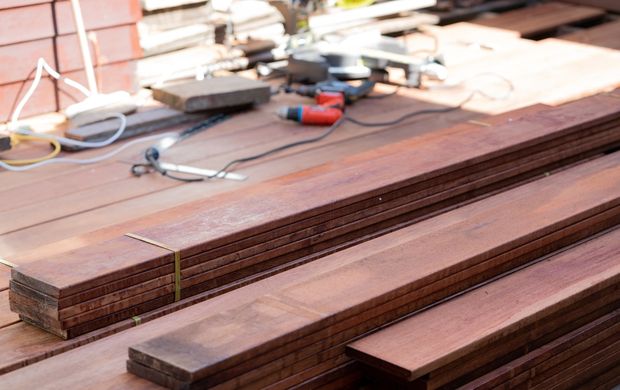 Known for its durability and incredible toughness, other names for Merbau include Borneo teak, Moluccan ironwood, and scrub mahogany. Seen in the wild, Merbau is an impressive tree, reaching up to 40 m in height and forming part of the upper canopy in tropical forests.
Known for its durability and incredible toughness, other names for Merbau include Borneo teak, Moluccan ironwood, and scrub mahogany. Seen in the wild, Merbau is an impressive tree, reaching up to 40 m in height and forming part of the upper canopy in tropical forests.
The benefits of using Merbau for decking
Merbau has many advantages compared to soft wood decking timbers, the foremost being its strength, resistance to pests and its attractive colour. Read on for a breakdown of Merbau’s merits.
Toughness and durability
The common name “ironwood” clues you in to one of Merbau’s most notable properties – it’s hardness. This toughness means it’s durable; if properly cared for, a Merbau deck will outlast other softer timbers. The hardness of Merbau can also have a blunting effect on saws and hand tools and holes in Merbau timber decking should ideally be pre-drilled before the decking is screwed down. 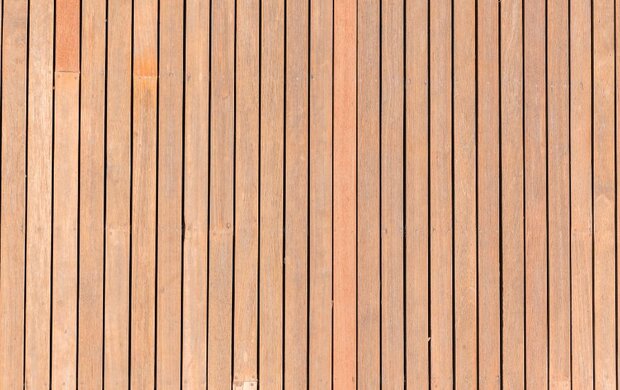
Attractive colour and texture
Merbau is known for its rich red to dark brown tones. It has an attractive grain and texture that, combined with its availability and initial purchase price make it a popular choice for people wanting a decent quality entertainers’ deck or for an outdoor pool area. Merbau has an even texture with a naturally glossy look due to the high amount of oil the wood contains (more on this later). 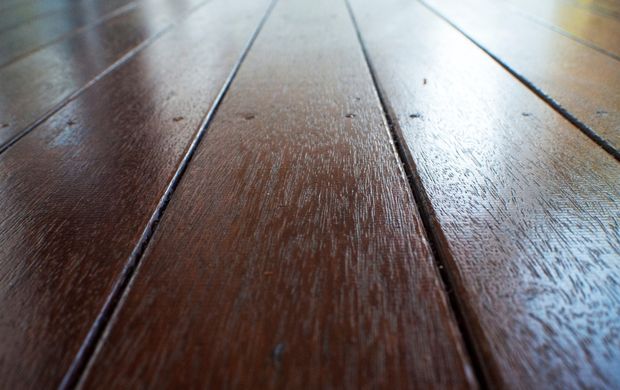
Fire and pest resistant
Merbau is considered a naturally bushfire-resistant timber, a trait of particular importance in Australia. This classification doesn’t mean it won’t burn, rather that it burns at a lower heat, just as a fire-treated timber might burn. Similarly, Merbau is also very resistant to insect damage. The hardness of the timber means it is less likely to be attacked by termites compared to some softer timbers. 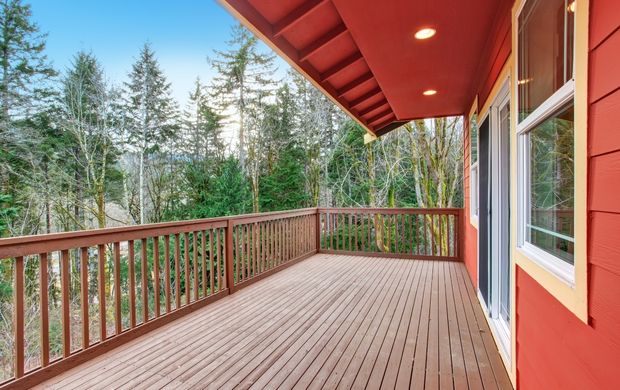
Disadvantages of using Merbau timber for decking
Although Merbau is among the more popular hardwood timber options in Australia, it’s also important to know what might steer consumers away from this choice. Below we unpack how Merbau can also be costly, high maintenance, messy, and have a detrimental impact on the environment.
Staining
The bright colour of Merbau timber is due to the wood’s high content of oils, tannins, and sap. Over time, and particularly when subject to wet weather conditions, Merbau can discharge these compounds and stain surrounding areas, as well as any clothes or furniture that come into contact with the deck. This is less of an issue if the deck is laid above the soil but if it is above concrete or adjacent to a driveway or edging, this can result in unsightly red marks. There are some methods for dealing with this, including seasoning the wood for an extra few months before installation, bleaching with cleaning agents, and sealing with a high-quality decking oil. 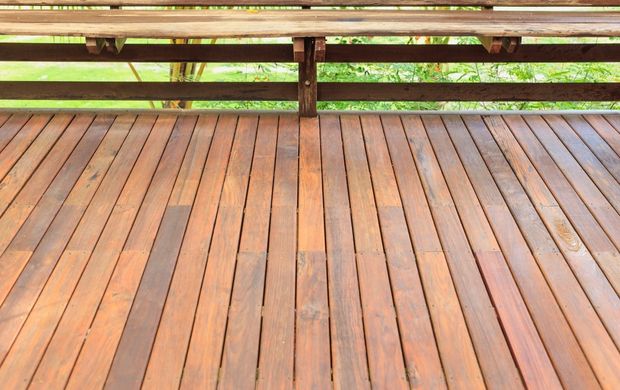
Environmental impact
The unfortunate truth about Merbau and other exotic timbers is that historically, some in the logging industry have used practices that are destructive and ecologically unsound. Although some sustainable sources for Merbau can be found, often it’s difficult to trace products to their origins and, due to the finite nature of a resource like Merbau, concerns that increased demand will lead to illegal practices and deforestation aren’t unfounded. Most Merbau is imported from Asia where sustainable forestry is not seen as a priority and reports indicate that substantial amounts of illegally harvested Merbau are currently being exported to China. As a slow growing rainforest timber, current demands will mean ongoing reduction in rainforest habitat. 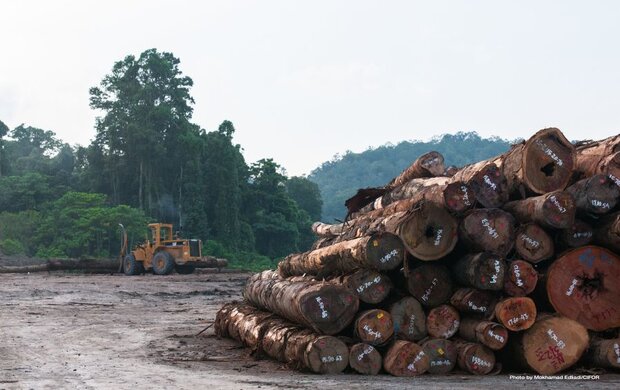
High maintenance
Like any timber decking, Merbau requires regular staining and sealing to retain an attractive finish and extend its lifespan and Depending on the coverage area of your deck, this can be a time consuming and costly job. Most Merbau decks require an annual application of one to two coats of high-quality deck oil. Once you add in the cost of the labour for cleaning, prepping, and oiling the deck, as well as the price of the chemical and oil products, the “real” costs increase significantly escalate. Consumers often fail to add in maintenance costs to their budget, which is why hardwood decks may appear cheaper at the outset but become a burden over time. Combined with its propensity for staining and the fact that it has been cut out of a rainforest is leading some consumers to dismiss Merbau as being a little too costly and high maintenance. 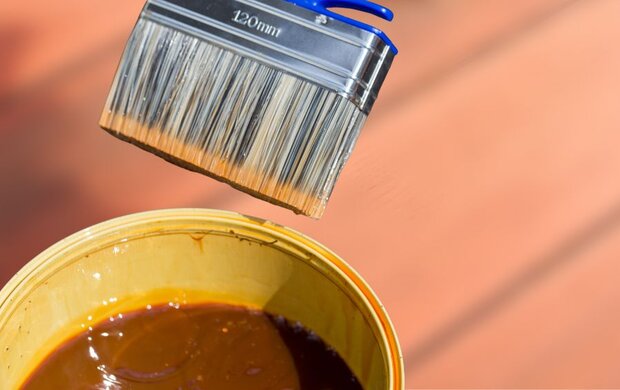
Composite alternatives to Merbau decking
If a hardwood deck strikes you as expensive and high maintenance, the staining seems off-putting, or you have concerns about deforestation, you may wish to opt for a quality composite decking, like Futurewood’s CleverDeck range, in lieu of Merbau. Some benefits of using a composite decking timber include:
Eco-friendly
Composite decking products are generally made up of pre-existing materials, including mill scraps, recycled wood, and recycled plastic. Unlike a deck that’s completely hardwood timber or completely plastic, a composite deck makes use of recycled materials. While pure hardwood contributes to deforestation and fully plastic decks may contain toxic polyvinyl compounds, most composite timber decking options alleviate both issues. 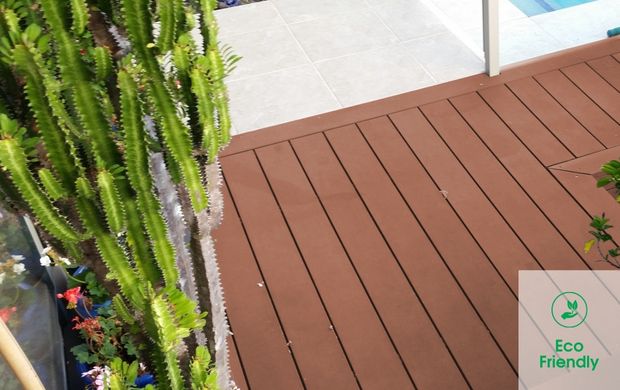
Low maintenance
Composite decking is basically the most hassle-free decking you can purchase. Unlike Merbau, composite timber decking requires no annual re-oiling. Composite timber also doesn’t require sanding or staining, and it doesn’t fade, release tannins, or change in texture over time. Cleaning your deck is still a necessity, but this can be done with plain old soap and water and is an easy DIY job, which is unlikely to involve hiring professionals. 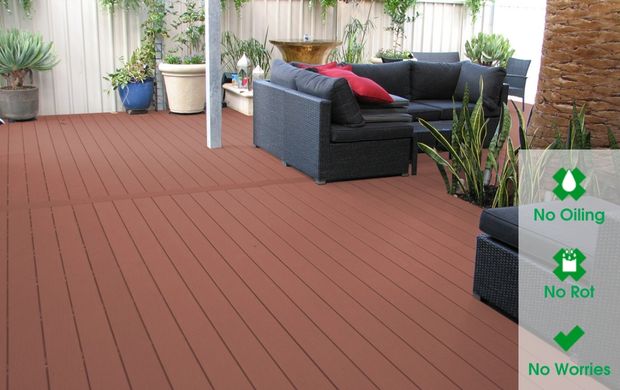
Overall cost
While purchasing hardwood timber like Merbau may appear cheaper at the outset, this doesn’t take into account the cost of continued maintenance. Oils, stains, and sealants aren’t cheap and to keep most hardwoods looking good, applications of these are needed at least once a year. 
Aesthetically pleasing
Though many people like to claim the appearance of a timber deck could never be matched by a composite, it’s likely they haven’t kept up to date with the advances in composite technology. Having a composite timber deck doesn’t have to mean something with a weird shine or texture, or a tacky fake-looking wood grain. Over the years, composite timber decking technology has developed significantly, and many options are available that have the same lustre, texture, and appeal as a pure timber deck, as an example Futurewood’s composite timber decking is supplied in three different ranges with multiple colour and finish options to choose from. 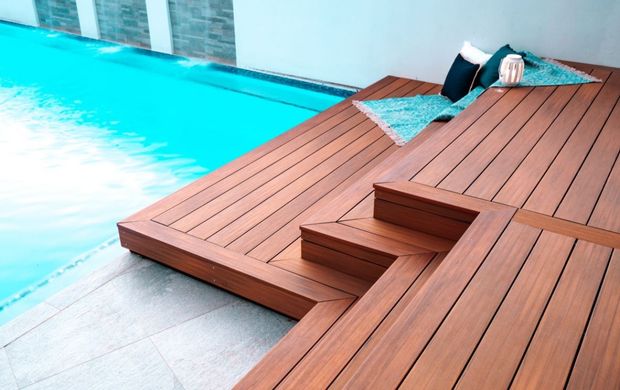
The bottom line
If you’re considering investing in a Merbau deck, it’s important to weigh the pros and cons of your decision. Though Merbau has many advantages and is undoubtedly a beautiful wood, many consumers are unaware of deforestation practices or are unprepared for the maintenance and seepage issues that come with using a high-tannin timber like Merbau. Composite timber decking solutions have come a long way since their inception and can make for an excellent, eco-friendly, easy-care deck – without sacrificing on colour or texture.